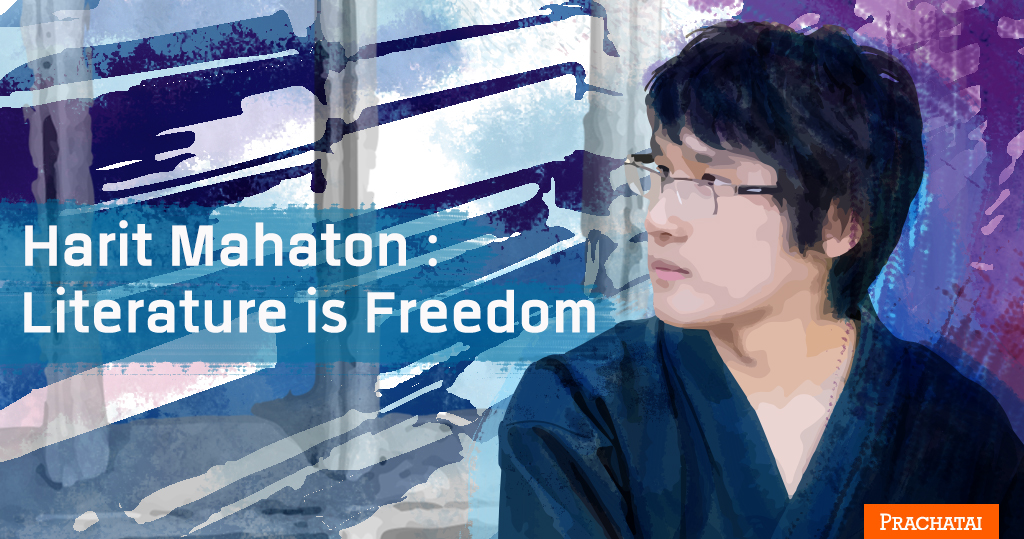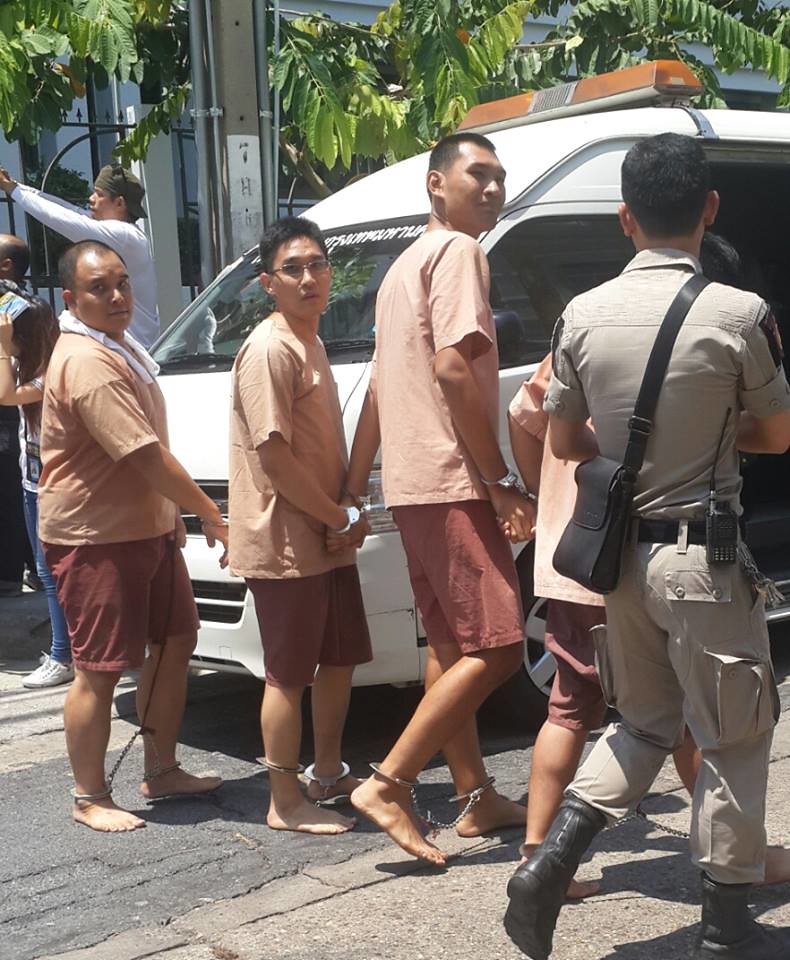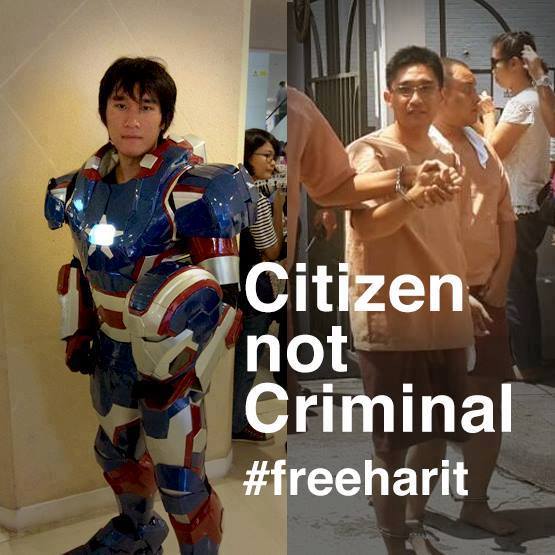At dawn on 27 April 2016, chaos unfolded among activists in the social media world, human rights activists and political observers. Information was shared over the internet that military officials were arresting and detaining several persons in Bangkok and other provinces. The smoke cleared in the late morning of the crackdown, revealing who had been arrested, how many, and why they were abducted.
On 28 April 2016, the dust settled. Eight detainees were transported from the 11th Military Circle to the Crime Suppression Division and charged with sedition and violating the 2007 Computer Crime Act for making the We Love Gen Prayut Facebook page. The arrests reflected the fragile mentality of the leader of the country who cannot tolerate laughter and satire. Two among the eight were also charged under Article 112 of the Criminal Code, the royal defamation law.
Harit “Pon” Mahaton, an introvert writer and a Ramen noodle restaurant owner was among the eight people charged with these crimes. It is hard to believe that a man known among his friends as a gentle-hearted person, as sweet as a big-eyed Japanese manga lady, has become a threat to Thai state security.
Read and Read More
Harit, or Pon, lost his mother to leukaemia when he was only nine. His most treasured memory is the face of his mother telling him to read and read more because knowledge is the most important thing. His mother had cultivated the reading habit when she was alive. Her words motivated Pon to read cartoons and literature since his childhood.
Pon likes fantasy novels, thrillers, historical novels and Chinese philosophy. He also practises the Chinese martial art called Xingyi Kungfu, or ‘five elements form’, and Tai chi, with an interest in Chinese philosophy. His friends recount that Pon is especially fond of Chang Tuan Jing, the Book of Flexibility and Changes. His favourite novels during his early period were His Excellency of Time by Lawitra, the pen name of Pannitsa Bhumiwatra. He is inspired by Japanese thrillers by Otsuichi, especial “Goth: Wristcut” and “Summer, Fireworks, and My Corpse.” He started writing novels shortly afterwards because he found there was nothing worth reading.
Light Novels
Harit Mahaton (second from left) is chaned at his ankle when the eight was taken to the court on 10 May 2016 Photo from Sa-nguan Khumrungroj
Apart from Chinese philosophy, Harit is also interested in Western political philosophy. His major turning point was the fact that he became addicted to Niccolò Machiavelli’s The Prince, a classic and controversial work that had a profound effect when he was a political science student at Thammasat University. The Prince was adapted in the middle period of his writings. The Diplomat of Centara and The Rainbow Crown was second runner up in the second Jamsai Publishing Books Young Fantasy Writer Award in 2011. Like other writers, time has refined his books. His friends recall that Harit’s early novels were dark and gloomy but he embraced a lighter, more adventurous and fantasy side in his later work.
The Diplomat of Centara and The Rainbow Crown was not his first published work. He has regularly had web-published novels on the Dek-D website, which is where he has built his fan base. In 2005 he self-published a handmade novel entitled Teardrop in the Middle of a Black Sky. His latest work is Noah's Guardian, which was published in 2016.
Most of Harit’s work is classified as light novels -- novels primarily targeting teenagers and young adults. The light novel genre focuses on fantasy and popular unputdownable stories, as opposed to ‘heavy’ literature admired by hardcore bookworms who look down upon light novels as second-rate literature.
G. K. Chesterton, an important English writer and political critic, who created the Father Brown character in detective literature, said "Literature is superfluous. Fiction is necessary.”
Harit considers light novels as the future of the book industry. Light novels are enjoyable whenever there is nothing to do. A friend of his said Pon has many light novel plots in mind that he wants to transform into texts. Harit reasons that his preference for light novels is because the light novel is easily accessible and does not need the label of high literature, something it is not interested in. He only cares that people like and buy the books.
“Literature is a Form of Freedom”
Harit was a two-term president of Thammasat University Literature Club. A close friend recounted that during his term, the Club was very active. He tried to push members to write and publicize their work to outsiders in contests or by sending stories to publishers. He also organized many seminars.
In 2013, Harit joined the Thai Writers Guild as an annual associate member because he wanted to join their activities and aimed to connect the world of the new generation of writers of fantasy novels in the light novel genre to the high literature authors.
“Literature is not social guidance. It is freedom.” He did not view literary contests as an indicator of a good novel. He said the quality of a book depends on its readers. The more readers, the more critics and comments, the more one would know if a book is good or otherwise. As a result, he is interested in literary criticism and wants to read many literary critics. He thinks literary criticism improves literature, although many people did not welcome his criticism because they cannot tolerate his frankness,” a friend said.
Harit’s literary criticism is frank to the point of being offensive, capricious, harsh, unrelentingly direct and adversarial. He is fearless of conflict. Harit even warned friends of lame cartoons and often recommended fine cartoons with less catchy graphics. Some of his criticism also suggested appropriate genres to different characters of people.
Harit’s works and ideas reflect the idea that literature is not noble. He often said to friends that writing is not creating an art, but is the construction of a new world. Recently, literature has been hard to sell because although people have money to buy, literature cannot adjust to and accommodate common people. This is the reason Harit writes light novels aimed at young readers and simplifies intricate content in 'Noah's Guardian’ — a novel about underdogs in the last human spacecraft, who want to prove that they are not as useless as they have been condemned to be. The novel touches on and reveals the caste system, social sophistication and sacrifice to protect others. Harit’s literature often speaks of the search for identity and freedom.
He once said to a friend “Literature is a form of freedom.”
Don’t Abandon Hope.
A close friend who has known Harit since Grade 8 said that Pon did not want to be a great writer but he wants his work to be addictive and enjoyable.
“Pon dreams that he will create more enjoyable books. He believes that there are links between people and reading will spread such links.”
Unlike six other friends who were arrested, charged and released on bail on 10 May, Harit and Natthika Worathaiwich continue to be detained in jail because they face lèse majesté charges. Harit’s friends created a Facebook page called ‘
Starless Night-Harit Mahaton' to spread his ideas and works and to support him.
One piece of content quotes Harit’s post on the cardinal rule of his life.
"The most important rule is not to die, and secondly, not to abandon hope."
Do not abandon hope, even as the night sky is starless.






